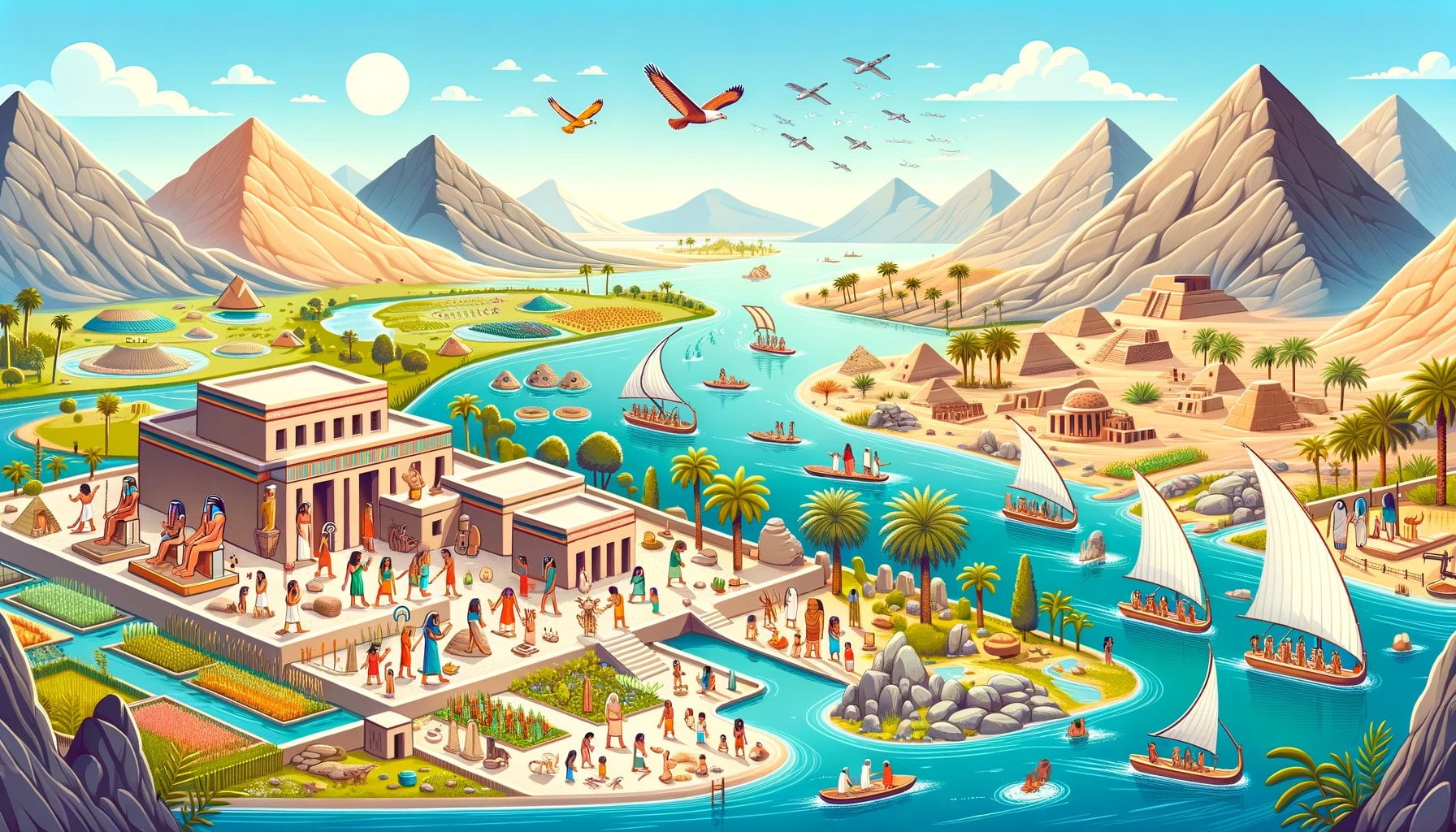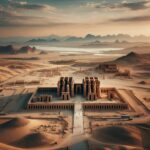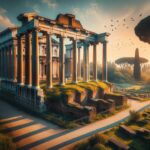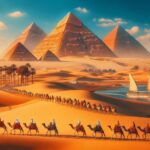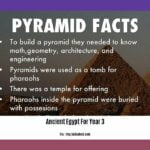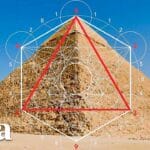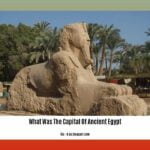Unveiling a Fascinating Legacy, “The Remarkable Achievements of Ancient Egypt” takes us on a captivating journey through the awe-inspiring accomplishments of one of history’s most extraordinary civilizations. From monumental architectural wonders to groundbreaking advancements in various fields of knowledge, this article explores the remarkable legacy left behind by the ancient Egyptians. As we delve into the enchanting world of pharaohs and pyramids, we will discover how their exceptional achievements continue to captivate and inspire us today.
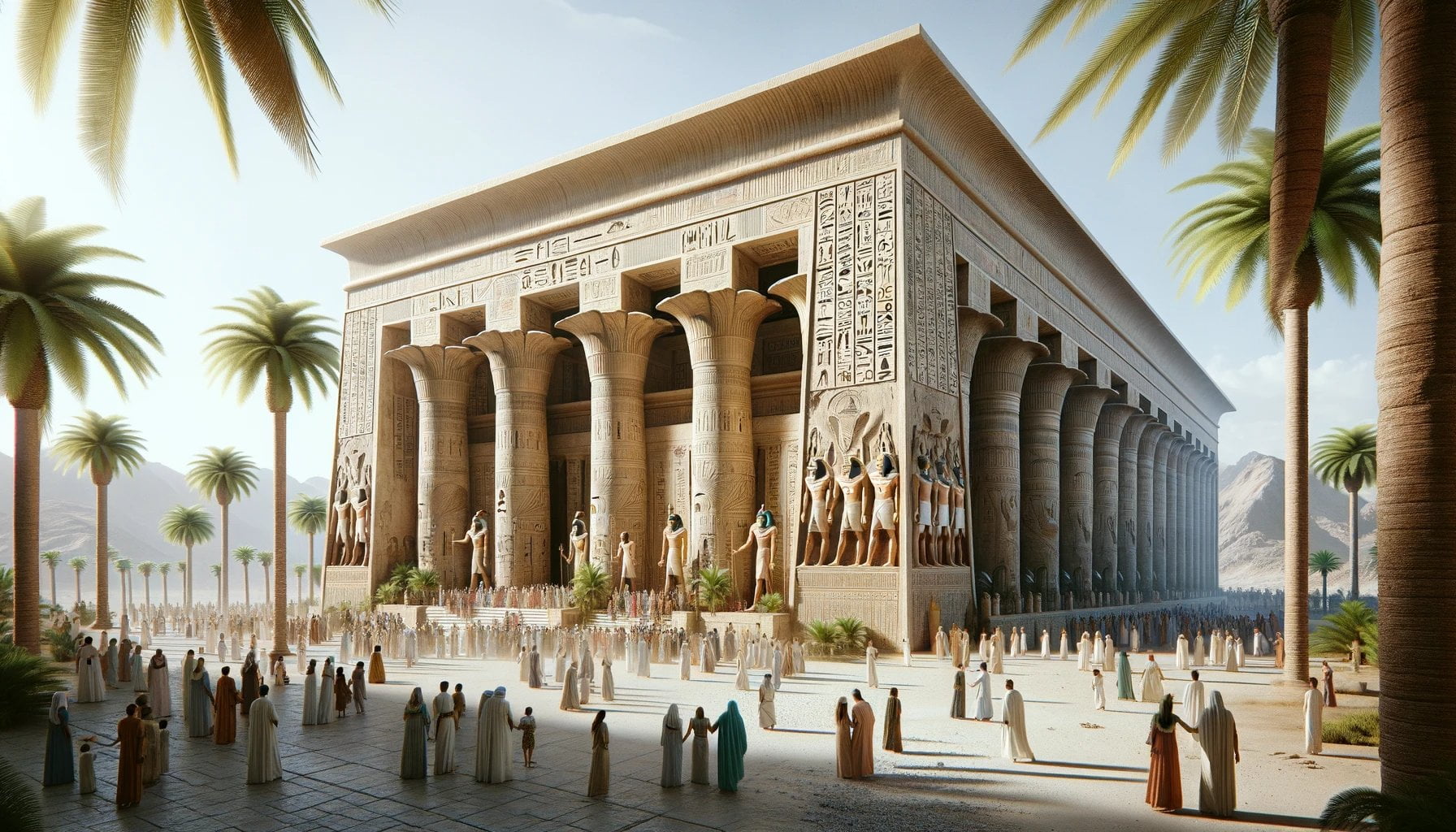
Key Takeaways:
- Construction: Ancient Egypt developed advanced techniques in quarrying, surveying, and construction, leading to the creation of monumental pyramids, temples, and obelisks.
- Writing: They developed one of the earliest writing systems in human history, known as hieroglyphics.
- Mathematics and Geometry: Ancient Egyptians had a sophisticated system of mathematics, including arithmetic, algebra, and geometry.
- Medicine and Surgery: They made significant advancements in medical knowledge, anatomy, and treatments.
- Astronomy: Ancient Egyptians made important contributions to the field of astronomy, studying celestial bodies and establishing a calendar system.
- Agriculture: They developed innovative irrigation systems and techniques to improve agricultural production in a desert environment.
- Art and Technology: Ancient Egyptians excelled in producing vibrant faience and glassware and created stunning artwork and architectural marvels.
- Literature: They produced various forms of literature, offering insights into their culture, beliefs, and rituals.
- Engineering, Shipbuilding, and Navigation: Egyptians displayed remarkable engineering skills in constructing structures and were skilled in shipbuilding and navigation, utilizing the Nile River for trade.
- Overall Achievements: These accomplishments showcase the ingenuity and impact of ancient Egyptian civilization across multiple fields, leaving a lasting legacy for future civilizations.
The Achievements of Ancient Egypt
The remarkable achievements of ancient Egypt unveil a fascinating legacy that continues to awe and inspire us to this day. From towering pyramids to advancements in mathematics, medicine, and the arts, the ancient Egyptians left an indelible mark on history. Join me on a journey through time as we explore the incredible achievements of this ancient civilization.
Monumental Architectural Wonders
The ancient Egyptians were master builders, creating monumental structures that still leave us in awe today. The Pyramids of Giza, including the Great Pyramid, stand as a testament to their architectural prowess. These impressive structures were built using advanced quarrying, surveying, and construction techniques. The precision with which these pyramids were constructed is a testament to the engineering skills of the ancient Egyptians.
Unveiling Hieroglyphic Writing
One of the most significant achievements of ancient Egypt was the development of hieroglyphic writing. Considered one of the earliest writing systems in human history, hieroglyphics allowed the Egyptians to communicate and document their lives, beliefs, and history. Deciphering hieroglyphics has given us valuable insights into the culture and achievements of this ancient civilization.
Advancements in Mathematics and Geometry
The ancient Egyptians were pioneers in the field of mathematics, developing a sophisticated system that included arithmetic, algebra, and geometry. They used their mathematical knowledge to accurately survey and design their architectural marvels. Their understanding of geometry resulted in precise measurements and symmetrical structures that are still admired today.
Medical Expertise and Surgical Techniques
Ancient Egypt had a practical and effective system of medicine, making significant advancements in medical knowledge, anatomy, and treatments. Their expertise in the field is evident in their knowledge of herbal remedies, surgical techniques, and even early dentistry practices. The ancient Egyptians understood the importance of cleanliness and developed a strong foundation for future medical practices.
Observing the Stars and Developing a Calendar
The ancient Egyptians were keen observers of celestial bodies. Their advancements in astronomy allowed them to accurately track the movement of the stars and planets. They developed a sophisticated calendar system based on their observations, aligning it with the annual flooding of the Nile River. This calendar was important for agricultural planning and religious rituals.
Innovations in Irrigation and Agriculture
Given their predominantly desert environment, the ancient Egyptians faced significant challenges in agriculture. However, they developed innovative techniques for irrigation, harnessing the power of the Nile River to cultivate crops. These advancements in irrigation and agricultural production were crucial for sustaining their civilization and ensuring food security.
Skilled Artisans and Architectural Marvels
The ancient Egyptians were renowned for their artistic and architectural achievements. Their carvings, paintings, and sculptures showcased incredible attention to detail and artistic skill. The grandeur and precision of their architecture, seen in temples, obelisks, and palaces, are a testament to their engineering feats. The meticulous craftsmanship and beauty of their artworks still captivate us today.
Literature and Cultural Insights
Ancient Egypt’s rich literary tradition provides us with a fascinating glimpse into their culture, beliefs, and rituals. The Egyptians produced various forms of literature, including religious texts, hymns, and stories. These texts offer invaluable insights into their religious practices, societal structures, and philosophical beliefs.
Engineering, Navigation, and Trade
The Egyptians displayed remarkable engineering skills, constructing temples, forts, and other impressive structures. They were also skilled in shipbuilding and navigation, utilizing the Nile River for trade and transportation. The interconnectedness of their civilization, facilitated by their engineering feats and trade activities, contributed to their influence in the ancient world.
Egyptian Faience and Glass Technology
Ancient Egyptians mastered the art of producing vibrant and intricate faience and glass. Their techniques for creating ceramic faience and glassware were unsurpassed at the time. These exquisite crafts were used for both practical and decorative purposes, reflecting the ancient Egyptians’ skill and creativity.
The achievements of ancient Egypt are nothing short of extraordinary. From their architectural wonders and advancements in various fields of knowledge to their artistic and cultural legacies, the ancient Egyptians continue to mesmerize us with their ingenuity and sophistication. As we delve deeper into their achievements, we gain a profound appreciation for the remarkable legacy they left behind.
The ancient temples of Egypt are truly a sight to behold. From the magnificent Great Pyramids of Giza to the stunning Temple of Luxor, each structure tells a captivating story of ancient civilization. Experience the wonder and grandeur of these historic landmarks by exploring the rich history and cultural significance of the Ancient Temples of Egypt. Check out our comprehensive guide on the Ancient Temples of Egypt and discover the secrets of the Pharaohs.
Contributions to Medicine and Healthcare Practices
Ancient Egypt, a civilization steeped in grandeur and mystique, holds within its remarkable legacy a rich tapestry of contributions to medicine and healthcare practices. From simple non-invasive surgeries to an extensive pharmacopoeia, the ancient Egyptians were pioneers in the field of healthcare, leaving behind a profound impact on the development of modern medicine.
A Glimpse into Ancient Egyptian Healthcare
The ancient Egyptians had a deep understanding of the human body and its ailments. They possessed a remarkable knowledge of anatomy, largely due to their extensive mummification rituals. Through these practices, they honed their understanding of human anatomy and developed medical techniques that continue to influence modern healthcare.
The Marriage of Religion and Science
For the ancient Egyptians, medicine was not limited to the physical realm. They recognized the importance of the spiritual aspect of healing and seamlessly integrated religion with medical practices. This harmonious relationship allowed for a holistic approach to healthcare, where medical treatments were accompanied by magical incantations and spiritual rituals.
Specialization and Cleansing
Ancient Egyptian medicine showcased a system of specialization, with doctors, midwives, nurses, and dentists all playing crucial roles in healthcare. These skilled practitioners understood the importance of cleanliness in patient care, laying the foundation for hygienic practices that persist to this day.
Advancements in Medical Knowledge
The ancient Egyptians were pioneers in the field of medicine, successfully diagnosing and treating various illnesses. They developed an extensive pharmacopoeia, recognizing the healing potential of different plants and substances. Moreover, they discovered the cause of certain diseases and formulated effective cures.
Enduring Impact and Lasting Legacy
The contributions of ancient Egyptian medicine have had a lasting impact on modern healthcare practices. Their understanding that disease could be treated with pharmaceuticals, as well as their recognition of the healing potential of massage and aromas, laid the foundations for contemporary medical treatments.
Key Takeaways:
- Ancient Egyptians made significant contributions to healthcare, including advancements in surgery, dentistry, bone-setting, and pharmacology.
- They recognized the importance of cleanliness in patient care and embraced specialization in medical practice.
- The ancient Egyptians replaced myth with medical fact, fostering the development of evidence-based medicine.
- Their profound understanding of human anatomy, gained through their meticulous mummification rituals, influenced later traditions, including those of the Greeks.
- Ancient Egyptian medical texts provide valuable insights into their practices, although few in number.
- The marriage of religion and science allowed for a holistic approach to healthcare.
Art and Literature of Ancient Egypt: A Rich Cultural Legacy
The art and literature of ancient Egypt offer a glimpse into a fascinating civilization that left behind a remarkable cultural legacy, encompassing magnificent architectural marvels and captivating works of literature. Let’s delve into the world of ancient Egypt’s art and literature and explore the wonders it holds.
Ancient Egyptian Art: An Everlasting Beauty
Ancient Egyptian art is renowned for its timeless beauty, evoking a sense of awe and admiration even today. The artistic tradition of ancient Egypt spanned millennia, from the 6th millennium BC to the 4th century AD, and its style remained surprisingly consistent throughout. The Egyptians valued harmony, symbolized by the concept of ma’at, which is evident in their art.
From the towering pyramids of Giza to the exquisite paintings adorning the walls of tombs, Egyptian art manifests the creativity and skill of its artisans. The art often portrayed pharaohs and gods, depicting their idealized forms with meticulous attention to detail. But it also beautifully captured scenes from everyday life, allowing us to peer into the daily activities of ancient Egyptians.
One of the most extraordinary aspects of ancient Egyptian art is its ability to withstand the ravages of time. Many of the art pieces we see today in museums were created in royal or elite workshops, utilizing the finest materials and craftsmanship. The longevity of their artwork speaks volumes about the Egyptians’ dedication to perfection.
The Beauty of Egyptian Literature: A Glimpse into Ancient Minds
Egyptian literature provides us with invaluable insights into the culture, beliefs, and rituals of this ancient civilization. Although much of the literature has been lost, some surviving writings give us a glimpse into the intellectual achievements of the time.
The most significant anthology to explore the literary wonders of ancient Egypt is “The Literature of Ancient Egypt.” In this fascinating collection, fresh translations of ancient Egyptian texts transport us to a world filled with mythical tales, religious hymns, and practical wisdom.
From religious texts like “The Book of the Dead” and “The Pyramid Texts” to love poems and moral teachings, Egyptian literature captures the essence of their society. These writings depict a people who revered their gods, valued the power of words, and sought to maintain harmony with the cosmos.
Key Takeaways:
- Ancient Egyptian art and architecture reflect the cultural value of ma’at, emphasizing harmony.
- The art showcases meticulous attention to detail and consistency in style across millennia.
- Egyptian literature provides insights into their culture, beliefs, and rituals.
- “The Literature of Ancient Egypt” offers fresh translations of ancient Egyptian texts, allowing us to explore a fascinating world.
- Egyptian literature includes religious texts, love poems, and moral teachings, revealing the multifaceted nature of their society.
Enduring Impact: Ancient Egyptian Influence on Modern Society
From monumental architectural wonders like the Pyramids of Giza to advancements in astronomy, mathematics, medicine, and the arts, the achievements of ancient Egypt continue to captivate and inspire us today. The ancient Egyptian civilization had a profound and enduring impact on modern society, influencing various aspects of our lives. Let’s dive deeper into this remarkable legacy and explore the enduring influence of ancient Egypt on our world.
Communication and Travel
The ancient Egyptians developed hieroglyphic writing, one of the earliest writing systems in history, to communicate and document their lives and history. These intricate symbols allowed for the recording of important information and the preservation of knowledge for future generations. Much like our modern communication systems, hieroglyphs conveyed both practical and symbolic messages.
Ancient Egypt’s well-developed writing system also facilitated travel and trade. It enabled the Egyptians to communicate across vast distances and establish diplomatic relations with neighboring civilizations. Their advanced knowledge of navigation and shipbuilding allowed them to navigate the Nile and the Mediterranean, fostering trade and cultural exchange.
Food and Fashion
The ancient Egyptians were pioneers in agriculture and irrigation techniques. They harnessed the power of the Nile River and its annual flooding to cultivate fertile land, ensuring a steady food supply for their civilization. They cultivated various crops, including wheat, barley, flax, and fruits, which continue to be staples in our modern diet.
The influence of ancient Egyptian fashion can be seen in its enduring aesthetic. The iconic image of a pharaoh in a headdress and linen garments has influenced modern fashion designs. Their use of intricate patterns, rich colors, and flowing fabrics set the foundation for textile and fashion trends that continue to inspire designers today.
Medicine and Healthcare
Ancient Egypt had a highly advanced medical system that included knowledge of herbal remedies, surgical techniques, and dentistry practices. They were the first to practice a type of gynecology in history. The Egyptians’ deep understanding of human anatomy was gained through their meticulous mummification rituals. They integrated religion and science into their medical practices, recognizing the interconnectedness of physical and spiritual well-being.
The ancient Egyptians developed an extensive pharmacopoeia and identified the cause of diseases. Their contributions to medicine and healthcare practices have had a lasting impact on modern society. Many of their remedies and treatments played a significant role in shaping the foundation of modern medical practices.
Cultural and Artistic Expression
Ancient Egypt had a highly distinctive culture that developed instantaneously. Their rich literary tradition, including religious texts, love poems, and moral teachings, provides invaluable insights into their beliefs, rituals, and way of life. Works such as “The Literature of Ancient Egypt” offer a captivating window into their world.
Egyptian art is renowned for its timeless beauty and craftsmanship. The artworks often portrayed pharaohs, gods, and scenes from everyday life, showcasing incredible attention to detail and skill. Ancient Egyptian art has influenced artists throughout history and continues to inspire contemporary art forms.
Key Takeaways:
- The ancient Egyptians developed hieroglyphic writing, facilitating communication and travel.
- Their advanced agricultural techniques provided a steady food supply and influenced modern farming practices.
- Ancient Egyptian medicine and healthcare practices had a profound impact on modern medical practices.
- Their cultural and artistic expressions, including literature and art, continue to inspire and influence contemporary works.
In summary, the enduring impact of ancient Egypt on modern society is undeniable. Their achievements in communication, travel, food, fashion, medicine, and the arts have left an indelible mark on humanity. By understanding and appreciating the remarkable legacy of ancient Egypt, we can gain valuable insights into our own civilization and continue to be inspired by the achievements of this extraordinary ancient civilization.
References:
Ancient Egypt. (n.d.). https://education.nationalgeographic.org/resource/resource-library-ancient-egypt/
Bowman, A. K., Wente, E. F., Dorman, P. F., Samuel, A. E., & Baines, J. R. (2023, September 30). Ancient Egypt | History, Government, Culture, Map, & Facts. Encyclopedia Britannica. https://www.britannica.com/place/ancient-Egypt
Ancient Egypt. (2023, September 27). Wikipedia. https://en.wikipedia.org/wiki/Ancient_Egypt
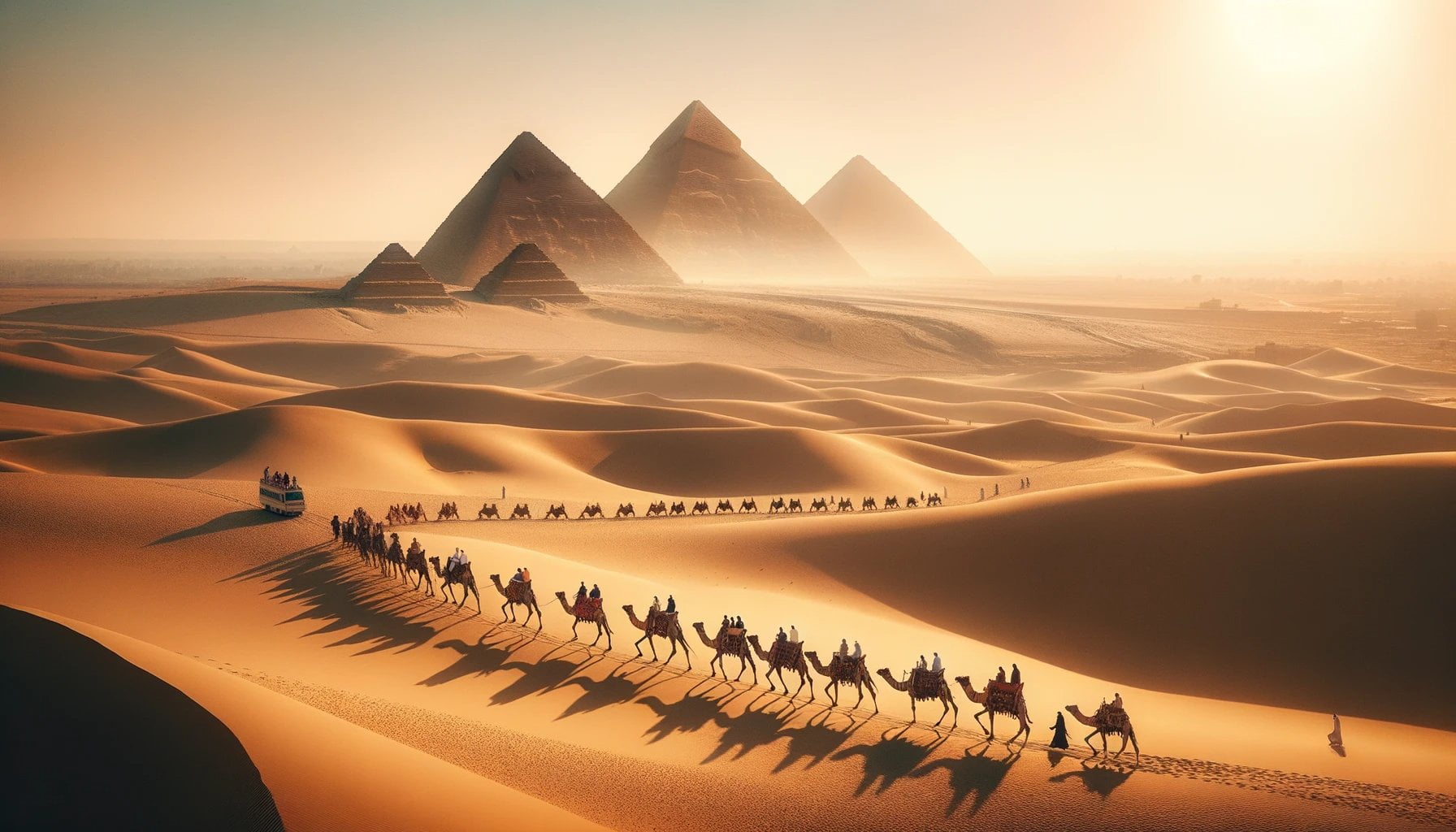
FAQ
Q1: What are some notable achievements of ancient Egypt?
A1: Some notable achievements of ancient Egypt include the construction of monumental pyramids, temples, and obelisks, the development of hieroglyphic writing, contributions to mathematics and geometry, advancements in medicine and surgery, the study of astronomy and development of a calendar, innovative irrigation systems and agricultural production techniques, advancements in faience and glass technology, the creation of new forms of literature, remarkable engineering feats, shipbuilding, and navigation, as well as artistic and architectural achievements.
Q2: What contributions did ancient Egyptians make to medicine?
A2: Ancient Egyptians made significant contributions to healthcare, including simple non-invasive surgery, setting of bones, dentistry, and an extensive pharmacopoeia. They understood that diseases could be treated with pharmaceuticals and recognized the healing potential of massage and aromas. Ancient Egyptian medical practitioners specialized in specific areas and emphasized the importance of cleanliness in patient care. Their knowledge of human anatomy and healing was influenced by extensive mummification rituals. The contributions of ancient Egyptian medicine have had lasting impacts on modern healthcare.
Q3: What were some key achievements in ancient Egyptian art and architecture?
A3: Ancient Egyptian art and architecture include monumental structures like the pyramids of Giza, as well as temples, sculptures, paintings, drawings, jewelry, and applied crafts. Egyptian art was a conservative tradition with a style that changed very little over time. It reflected the cultural value of ma’at (harmony), which was central to the civilization. The artifacts and monuments of ancient Egypt continue to hold fascination for people today, showcasing the grandeur and precision of their artistic and architectural achievements.
Q4: How did ancient Egyptian civilization shape the modern world?
A4: Ancient Egyptian civilization had a significant impact on the course of history and influenced modern society. The Egyptians made inventions and discoveries that shaped the modern world, including advancements in various fields such as medicine, mathematics, astronomy, agriculture, and art. They also developed sophisticated systems and technologies, such as hieroglyphic writing and advanced construction techniques. Their achievements and monuments continue to inspire and captivate people, providing valuable insights into the ingenuity and sophistication of ancient Egyptian civilization.
Q5: How did the Nile River contribute to the development of Egyptian civilization?
A5: The Nile River played a crucial role in the development of Egyptian civilization. Its annual flooding provided reliable and fertile soil for agriculture, allowing ancient Egyptians to cultivate crops and sustain a thriving society. The river served as a vital transportation route for trade, facilitating economic growth and cultural exchange. The abundance of food and resources along the Nile contributed to the prosperity and longevity of ancient Egypt, making it a preeminent civilization in the Mediterranean world for almost 30 centuries.
